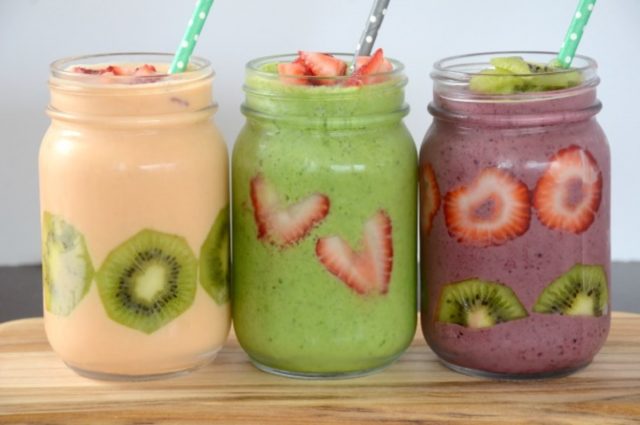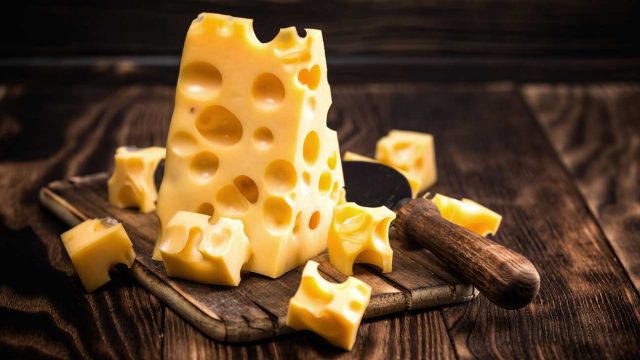The 18 Best Healthy Foods to Gain Weight Fast
Everybody knows that losing weight is a difficult task but gaining weight is seen as an enviable one. I mean, all you have to do is eat all those delicious, sugary, junk foods, right? Wrong! Not unless you want a bulging belly and to severely compromise your health!
When people intend to gain weight, they want to add muscle. Although tricky to navigate, there are ways to gain weight in a healthy and effective manner. The main thing to manage is your diet, of course, so here are 18 of the best foods to help you gain weight or add the muscle the right way:
-
Homemade Protein Smoothies
Protein smoothies are an excellent way to gain weight quickly, and there is no better alternative to making them at home. Steer clear of the commercially-produced protein drinks and powders because more often than not, they are filled with sugar and additives that don’t really give you any other nutrients.
Making your own protein smoothies gives you full control over flavor and nutrition. And they pretty easy to make. Below are just a few variations you can try. Just blend them up with 2 cups (470ml) of milk (dairy or soy are superior to any other alternative when it comes to nutrition and calorie-content).
Each of these smoothies comes with a calorie-content of 400-600. Along with high doses of protein, they also provide other important vitamins and minerals to the body.
Chocolate banana nut shake: 1 banana, 1 scoop of chocolate whey protein, and 1 tablespoon (15ml) of peanut or another nut butter.
Vanilla berry shake: 1 cup (237ml) of fresh or frozen mixed berries, ice, 1 cup (237ml) of high protein, full-fat Greek yogurt, and 1 scoop of vanilla whey protein.
Chocolate hazelnut shake: 15 ounces (444ml) of chocolate milk with 1 scoop of chocolate whey protein, 1 tablespoon (15ml) of hazelnut butter, and 1 avocado.
Caramel apple shake: 1 sliced apple, 1 cup (237ml) of full-fat Greek yogurt, 1 scoop of caramel- or vanilla-flavored whey protein, and 1 tablespoon (15ml) of sugar-free caramel sauce or flavoring.
Vanilla blueberry shake: 1 cup (237ml) of fresh or frozen blueberries, 1 scoop of vanilla whey protein, 1 cup (237ml) of vanilla Greek yogurt, and sweetener if needed.
Super green shake: 1 cup (237ml) of spinach, 1 avocado, 1 banana, 1 cup (237ml) of pineapple, and 1 scoop of unflavored or vanilla whey protein.
-
Milk
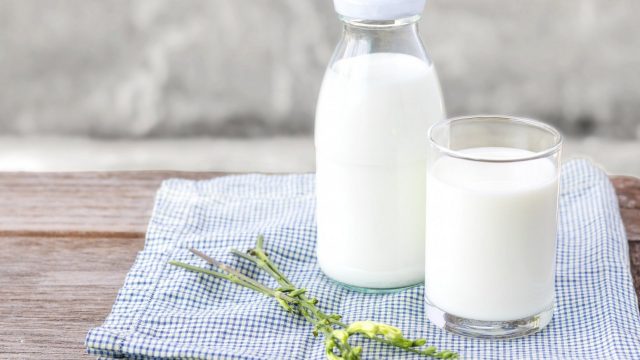
Milk is a great source of proteins, carbs, fats, and of course, calcium, along with many other vitamins and minerals. This is one of the reasons why it has been used by people who want to gain weight or build muscle for decades.
It is a great way to build muscle because milk is an excellent protein source and contains both casein and whey proteins. There is even research to back the claim that drinking milk can help build muscle when combined with weightlifting.
Studies have also found that when whey and casein are combined, it can lead to greater mass gain than any other protein source. Luckily, milk has both!
If you are looking to bulk up, include a glass or two of whole milk (149 calories per cup) into your diet. You can have it for breakfast, as a snack, or before and after a workout if you are training.
If drinking plain milk doesn’t sound too good to you, make it into a protein-packed smoothie! For an early morning protein boost, blend up 1 cup of frozen berries with 1 cup whole milk, add some honey and vanilla and you have a quick and easy nutritious breakfast! See the previous section for more delicious protein-rich smoothie ideas.
-
Rice
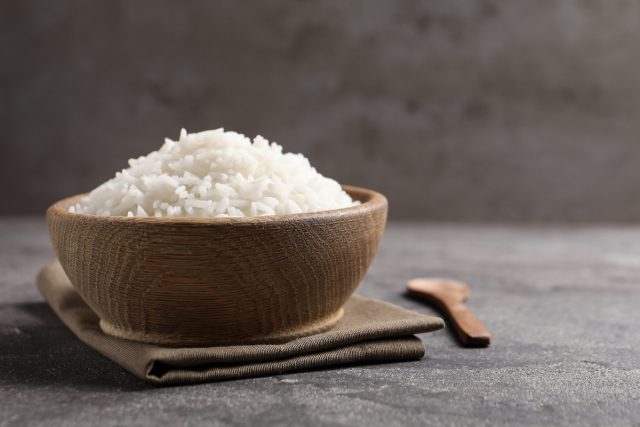
Rice is one of the best low-carb sources of gaining weight because it is calorie-dense. 1 cup of cooked white rice, which is about 158 grams, has roughly 204 calories, 44 grams of carbs, and only a small amount of fat. Being calorie-dense means you easily get a high amount of carbs and calories from a small serving. This helps you eat more food, especially if you have a poor appetite or get full quickly.
Rice is pretty easy to make, but if you are pressed for time, you can look for alternatives like 2-minute microwave rice packs. A better option would be to cook a large batch of it and freeze it in single portions.
Rice can also be easily made into a complete meal. Just some sauteed veggies, pan-fried chicken, scrambled eggs, or toasted nuts and seeds can make it taste delicious. It also goes very well with curries and sauces, which can even be bought premade or once again, batch-cooked and frozen. These can give you another way to boost the calorie and protein content of your meal.
-
Nuts and Nut Butters
Nuts are an excellent source of protein, which makes them a great aid in weight gain. Just a couple of handfuls of nuts per meal can add hundreds of calories to your diet. For instance, just a quarter cup of raw almonds has 170 calories, 6 grams of protein, 4 grams of fiber, and 15 grams of healthy fats.
You can add them into dishes like salads and smoothies or eat them just as they are as snacks. Or you can have them in the form of nut butter, which go great when spread on top of toast and crackers or mixed into smoothies.
Just be careful to check the ingredients to confirm that whatever nut butters you buy are made with 100% nuts. Avoid anything with sugar, additives, or extra oils. A better option would be to make your own nut butter at home, it is so easy! All you have to do is blend up some roasted nuts of choice until it goes completely smooth.
For a mid-evening pick-me-up, you can blend up some peanut butter (or other nut butter) with a banana and 1 cup of milk (total 270 calories).
-
Red Meats
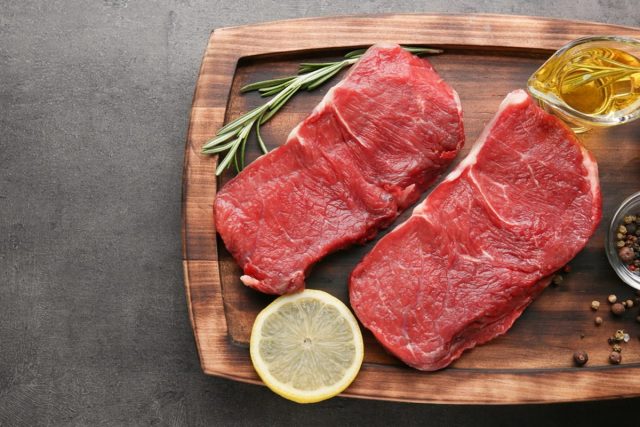
Red meats are one of the best foods that you can eat to help build muscle. Leucine is a key amino acid that the body needs to stimulate muscle protein synthesis and add new muscle tissue. A 6-ounce (170 grams) piece of steak contains about 5 grams of leucine, 49 grams of protein, and nearly 460 calories!
That’s not all. Red meats are one of the best natural sources of dietary creatine, which is probably the world’s best muscle building supplement!
While all cuts of meat are great sources of protein, fattier cuts are more calorie-dense, which aid in gaining weight. This helps add to the calorie content of your food and help you increase weight.
A study conducted on 100 older women found that those who added 6 ounces (170 grams) of red meat to their diets and performed resistance training 6 days a week for 6 weeks reported positive results. They had gained lean mass, had an 18% increase in strength, and had an increase in the important muscle-building hormone IFG-1.
Red meat is absolutely delicious, no doubt, so it shouldn’t be difficult to add to your diet. Although sometimes time-consuming, you can find slow-cooker recipes and other quick recipes that shouldn’t take too much of your time.
-
Potatoes and Starches

Starch is an excellent way to add extra calories to your meal, and one of the cheapest and most delicious ways to make your meals starch-rich is through potatoes! Other healthy sources of starchy carbs include quinoa, oat, buckwheat, and beans and legumes. Other than potatoes and sweet potatoes, you could also go for squash, corn, pumpkin, peas, and other winter root vegetables.
Potatoes and other starches add carbs and calories, but they also increase your muscle glycogen stores. Glycogen is the primary source of your body’s fuel for physical activity like sports and exercise. Most of these carb sources that we mentioned are rich in nutrients, fiber, and resistant starch, which can help nourish your gut bacteria as well.
Sweet potato toast is all rhw rage, so jump on the bandwagon if you want to gain weight! Wash, dry, and thinly slice some sweet potatoes and toast them in an oven or toaster. Then add your favorite toppings and enjoy! You can use this as an opportunity to add more healthy calories and proteins. For instance, you can add some scrambled eggs, a mashed avocado, or sprinkle with some toasted nuts. It makes for a perfect breakfast or a post-workout snack.
Quinoa makes a great meal for lunch or dinner. Although it is technically a seed, it is typically prepared and eaten like a grain. You can serve it in a salad, add it to soups and porridges, or make it into flour to add into bread.
Quinoa is what is called a “complete protein”, which means that it contains all nine amino acids that our bodies are unable to make on their own. It is also an excellent source of proteins, minerals, and B minerals.
For a healthy and carb-dense lunch, combine quinoa and roasted sweet potatoes! Add some additional complex carbs in the form of sour cream, grated cheese, mashed potatoes, olive oil, avocado oil, olives, hummus, whole grain bread/crackers, or anything else you can think of!
-
Salmon and Other Oily Fish
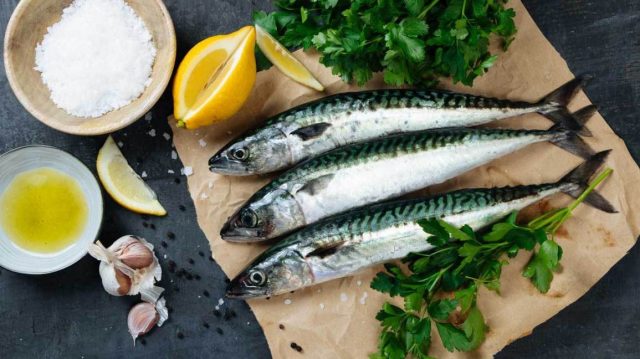
The next best option to red meat is oily fish such as salmon. They are excellent sources of protein, nutrients, and essential healthy fats that provide numerous health benefits as well as protection against several diseases. Of the healthy fats present in oily fish, Omega-3 fatty acids are one of the most important and well-known.
A 6-ounce (170 grams) piece of sockeye salmon fillet is enough to give you a healthy dose of protein, healthy fats, and calories. It contains around 250 calories, along with 12 grams of healthy fats and 37 grams of high-quality protein that can help build muscle or increase your weight.
Salmon can be prepared in a number of ways from steamed, poached, or baked, to sauteed or grilled. You could try smoked salmon, or even raw salmon can be eaten in the form of sushi or sashimi. Even canned salmon is a great option if you cannot afford the others! In fact, since almost all canned salmon are sourced from the wild and not farmed, they are most probably to have more nutrients present.
Here are some healthy and delicious ways to add salmon to your diet:
Use canned salmon in your regular tuna salad to give it a subtle spin or make a salmon salad with leafy greens, asparagus, and Greek yogurt, mayonnaise, or sour cream.
Spread some cream cheese on whole-grain toast or crackers and top with cucumber, capers, tomato, and smoked salmon.
Replace the chicken in a traditional Cobb salad with canned salmon. Finish off with a hard-boiled eff, avocado, lettuce, and tomatoes.
-
Protein Supplements
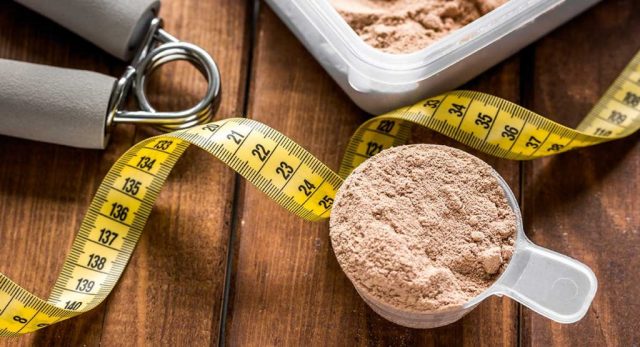
Protein supplements are a regular part of the diet for athletes and bodybuilders who are looking to gain weight. Whey protein supplements and mass gainers (supplements that help boost muscle mass) are a popular and cost-effective way to gain weight, especially when coupled with strength training.
Some people question if it’s healthy, but it is made from a completely natural source. Whey protein is made from dairy, and like other meats and animal products, it contains all the essential amino acids your body needs to stimulate muscle growth. Whey protein has also been proven to improve health markers and reduce the risk of disease.
There are also several other types of protein supplements available, such as soy, egg, and pea protein. You can use protein supplements before or after a workout, or even add them to snacks and meals at any part of the day. Protein supplements are especially important if you are also training since your daily requirement for protein is higher at that time.
Protein smoothies are the most popular and easiest way to add such supplements to your diet, but make sure to make it yourself rather than a ready-made one because those tend to contain loads of sweeteners and flavorings. Unflavored whey protein can be added to dishes like soups, oatmeal, and mashed potatoes as well!
-
Dried Fruit
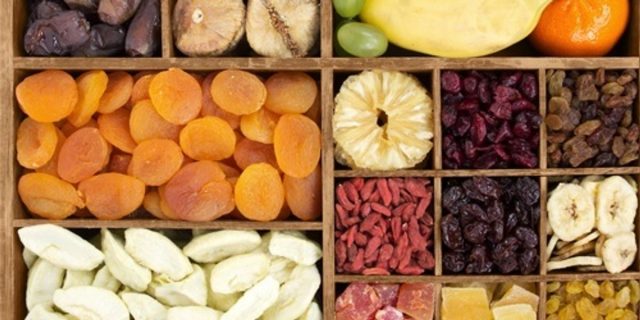
A high-calorie snack that tastes great and also provides plenty of antioxidants and micronutrients? What more do you need to convince yourself to go out and buy loads of dry fruit? How about this, dry fruit is a great source of fiber, vitamins, and minerals!
Some people worry that the drying process strips them of their nutrients, but that is not true. They are naturally high in sugar (the good kind!), which makes them a great weight gain assistant. They are also high in calories. Just two Medjool dates have about 130 calories total!
Apart from being great to snack on just as they are, you can use dried fruit in a variety of different ways to spruce up your meals. Pairing them with other healthy sources of protein and fat boosts the calorie and nutrient content of your meals.
You could add a few dates or other dried fruits into a protein smoothie, but you can also think beyond that. From mixing them into Greek yogurt with nuts for breakfast to adding them to a meat sauce or pairing them with cheese for a main or appetizer, to filling them with nut butter or cream cheese for dessert, there are endless possibilities!
-
Whole Grain Bread
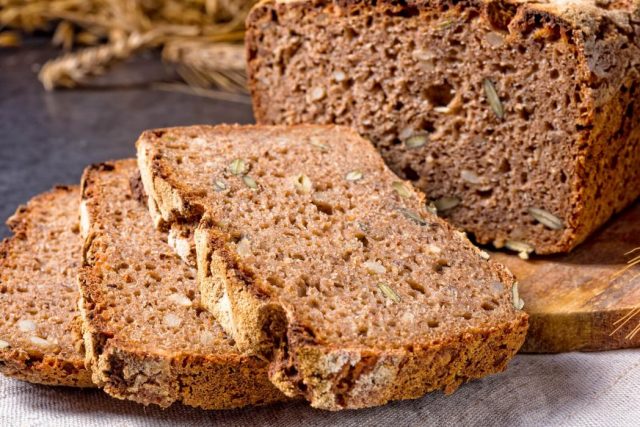
One of the best sources of good carbs to help you gain weight are whole grain bread. Bread can easily complete any meal from breakfast to dinner. And it pairs well with pretty much any other protein-rich foods from eggs, meat, and cheese, to nut butter and fruit.
Sandwiches are the quintessential convenience food. They are easy to prepare, can be made in an endless variety of flavorless both sweet and savory, and are great for helping pack on the weight. Try switching it up every day – you have so many options from a classic grilled cheese to healthy wraps.
When shopping for bread at the supermarket, get the natural whole grain kinds or seeded bread. Healthier versions, such as Ezekiel bread, are also available at most grocery stores.
Another type of healthy bread that has been rising in popularity, especially this past year during the pandemic, is sourdough bread. Many people, stuck at home, made their own sourdough starters and learned to make bread! It’s a great way to make bread at home, even if you are a beginner because it takes only flour, water, and salt to make it.
The best part? Just one slice of sourdough bread (weighing 2 ounces or 56g) has about 160 calories. You can load on some protein-rich fillings to up the nutrient content as well. Sourdough also has live good bacteria that feed the bacteria in your gut. This can help boost the health of your digestive system and your immune system as a whole.
-
Avocados
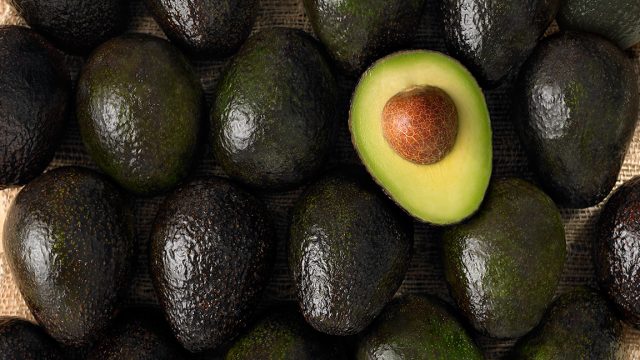
Avocadoes are one of the most calorie-dense fruits out there, making them a great aid to gaining weight. They are a great source of healthy fats and fibers as well. A single large avocado will give your around 322 calories, 29 grams of fat, and 14 grams of fiber. They are high in vitamins, minerals, and various beneficial plant compounds.
You could add avocadoes to several of your meals such as smoothies, sandwiches, or wraps. Or you could try the famous avocado toast! Avocado cream can be a healthy substitute for ice cream or even mayonnaise, and it goes great in salads, sushi, or even soups. You can grill it, bake it, pickle it, or eat it as is!
-
Healthy Cereals
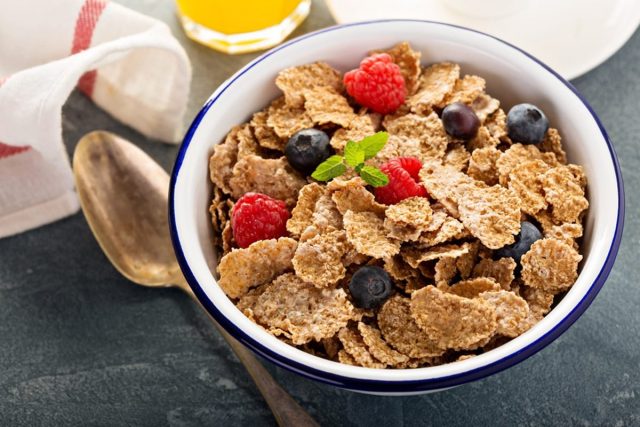
Grain-based cereals such as oats, granola, multigrain, and bran are high in beneficial nutrients and healthy antioxidants. They can be great for breakfast or as a snack when added to things like Greek Yogurt.
A cup of cooked oatmeal contains about 130 calories, and you can cook it with whole milk to add more. You could also top your oatmeal with healthy protein sources such as nuts, dried fruit, chia seeds, fresh berries, and homemade granola.
Granola is another great calorie-dense snack or meal addition. It contains a mix of cereals, dried fruits, and nuts – which provide a healthy dose of proteins, fiber, and micronutrients when combined. A half-cup of granola can give you about 200-300 calories! However, making your own granola is the best option as most commercially-produced kinds have added sugars.
You are better off skipping the cereals that are highly processed and contain loads of sugar, but healthy cereals are an excellent source of carbs, calories, and nutrients. Make sure to read the label so you can steer clear of the ones with added sugar, and to pick the cereals with the highest amount of fiber.
-
Cereal Bars
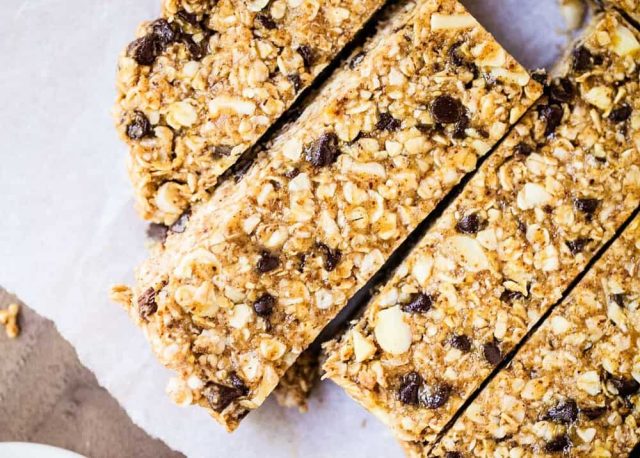
Cereal bars are a great snack, or even meal, option when you’re on the go. You could pair them with other protein sources like full-fat Greek yogurt, boiled eggs, cold meat cuts, or even protein shakes to boost the calorie and nutrition content of your meals.
Depending on what’s in the cereal bar, you can get about 150-200 calories from a single one! Cereal bars are also great before or after snack for a training session because they tend to contain a combination of slow and fast-digesting carbs.
If you know your way around a kitchen, you could make your own cereal bars, which gives you the benefit of controlling what goes in it and opening up a world of flavor combinations for you to try. This is also ideal since lots of commercially-produced cereal bars have added sugars, additives, and preservatives.
However, it’s not impossible to find healthy store-bought bars. Just be sure to read the labels carefully, and choose the ones made from healthy whole grains and other beneficial ingredients like nuts, seeds, and dried fruits.
-
Dark Chocolate
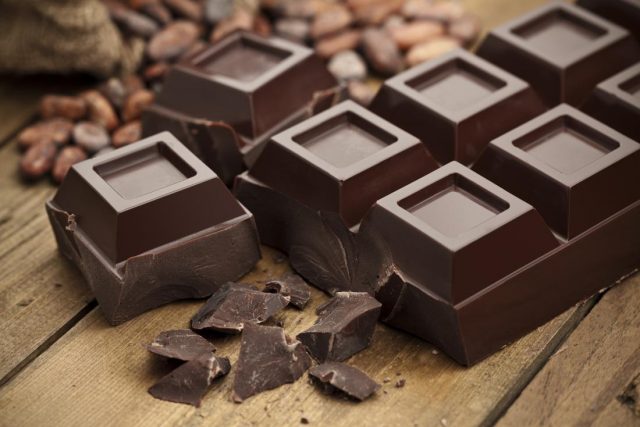
You may have heard that dark chocolate is good for you, but did you know that it can be a great way to help gain weight in a healthy manner? If you are a chocolate-lover looking to gain weight, your prayers have been answered!
High-quality dark chocolate contains loads of antioxidants and health benefits, including the regulation of stress hormones and blood sugar levels. It can even help reduce the risk of inflammations, stress, type 2 diabetes, and even heart disease and some cancers!
On the weight gaining front, dark chocolate is an absolute powerhouse. It has a high-calorie density, which means you can get a lot of calories from eating just a little bit of it. For instance, a 100-gram (3.5 ounces) bar contains about 600 calories, and not to mention health-promoting compounds such as magnesium and antioxidants.
However, you cannot just pick up any chocolate bar and expect to get all these benefits! It has to be the kind with at least 70% cacao. Cacao is the seed that chocolate is made from, and that’s where all these benefits come from. You have to be careful as most things marketed as chocolate nowadays have more sugar and additives than actual chocolate!
Obviously, you can eat chocolate as is, but you can also incorporate it into several healthy dishes and desserts. Chocolate makes everything better!
-
Cheese
Cheese, like chocolate, is high in calories and fat. Just 1 ounce of cheddar cheese (28g), which is only about the same size as a pair of dice, contains 110 calories and 7 grams of protein!
Cheese has been a staple food for centuries, and there is a reason for that. Not only is it easy to preserve and can be added to a variety of dishes, but it is also absolutely delicious! You can find countless varieties of cheeses from soft to hard, and even creamed. Cheese is generally high in cholesterol and saturated fat, and, like most things, is best when consumed in moderation. But healthy cheeses can be a great addition to your diet.
You can add several hundred calories to your meals just by adding some cheese. From childhood favorites of the good old grilled cheese or mac and cheese to sophisticated cheese and cracker snacks, this can be a delicious way to gain weight!
-
Whole Eggs
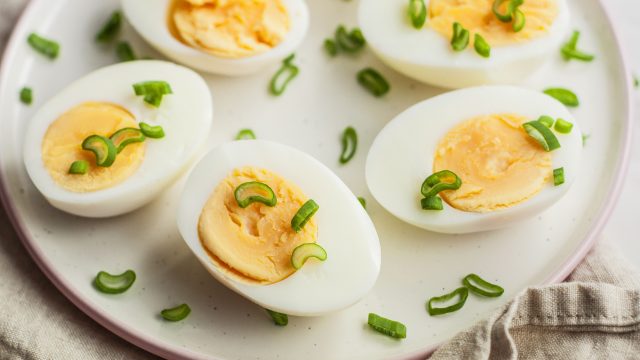
One of the healthiest and most cost-efficient, muscle-building foods you can find is eggs. They contain lots of high-quality proteins and healthy fats. One large raw egg weighs about 2 ounces with the shell (50g) and will give you about 74 calories.
There is no limit to how many eggs you should eat per day. As long as you don’t have any allergies to it, you can easily eat 3 or more per day. In fact, many athletes and bodybuilders consume up to 6 or more eggs in a day!
It is also important to consume the entire egg, especially since most of the calories and nutrients are contained in the yolk.
Eggs can be prepared in a variety of ways from boiling and poaching to frying and scrambling. Eggs are one of the most popular breakfast foods, and you can increase the nutrient content by adding vegetables, cheese, nuts, and more to them. They are also a great addition to everything from salads and sandwiches to casseroles and other bakes. Not to mention, eggs are an essential ingredient in lots of classic desserts from cakes and cookies to custards and puddings!
-
Full Fat Yogurt
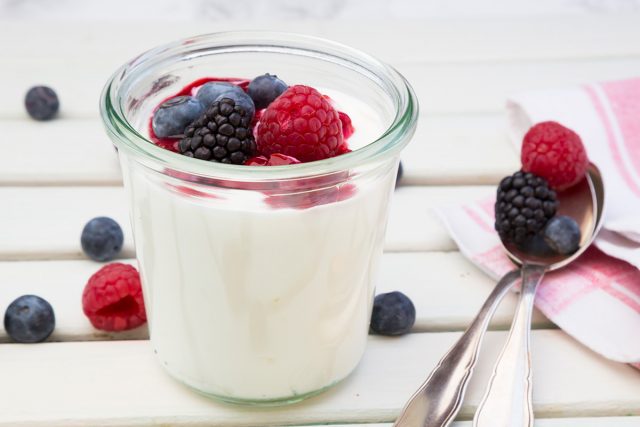
Another healthy and convenient snack that is high in proteins, carbs, and fat is full-fat Greek Yogurt. A 6-ounce serving of plain, whole milk yogurt contains roughly 165 calories and 15 grams of protein. Whole milk Greek yogurt is prepared by straining, which makes it thicker and therefore, has twice the protein content of regular yogurt.
It also contains less sugar in general, which is another thing you need to be careful about when purchasing yogurt at the store. Look for the brands that do not have added sweeteners, thickeners, or preservatives for the best nutrition.
Yogurt also has probiotics, or healthy bacteria, which promotes gut health. You can top your Greek yogurt with other healthy protein sources such as nuts and dried fruit to make it healthier and more calorie-dense.
You can add yogurt to your diet in a variety of different ways. Here are just a few of them:
Yogurt and fruit: Combine 1–2 cups of yogurt with fresh or dried fruit. Additional toppings nuts, seeds, honey, granola, dark chocolate, or coconut flakes also go great with this!
Chocolate peanut butter pudding: Mix 1–2 cups of yogurt with 100 percent cocoa powder, peanut or any nut butter, and a sweetener such as a stevia, honey, or sugar. A scoop of whey can be incorporated for more protein.
Yogurt parfait: Layer 1-2 cups of yogurt, granola, and mixed berries to create a well-balanced and delicious breakfast or snack.
Smoothies: Full-fat Greek yogurt can be a brilliant addition to pretty much any smoothie. It will make your drink thicker, creamier, and more delicious while increasing its protein and healthy fat content!
-
Healthy Fats and oils
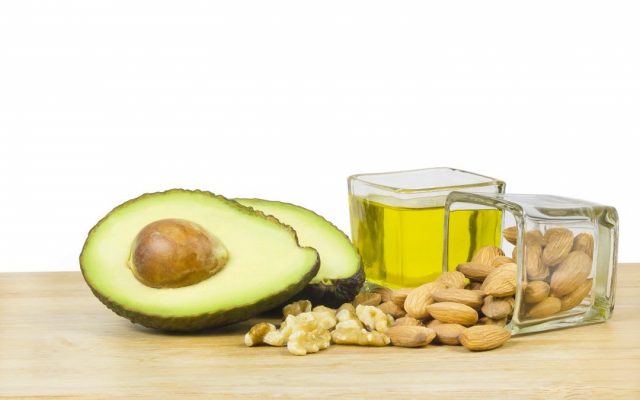
There isn’t a more calorie-dense food than healthy fats and oils. They can be a great addition to your meals to not only boost the calorie content but also to add flavor. Just adding 1 tablespoon of olive oil (15ml) to your food can increase it by 120 calories!
Healthy oils include the likes of extra virgin olive oil, avocado oil, coconut oil, etc. You can these to soups, sauces, salads, stir-fries, and more. If you want to try something completely out there, add it to your coffee! Butter coffee is made by blending brewed coffee with unsalted butter or coconut oil until it resembles a foamy latte – very trendy!
A Final Note
To gain weight quickly, you need to consume more calories than what you’re burning with physical activity. Calorie-dense food must also be nutrient-heavy so as to not adversely affect your health. You may also want to lift weights and work out so that the additional calories you consume are converted into muscle rather than just fat.
Incorporate the foods discussed on this list so you can enjoy your meals while also gaining weight in a healthy manner. Stick to healthy fats and oils, as well as high protein foods!

